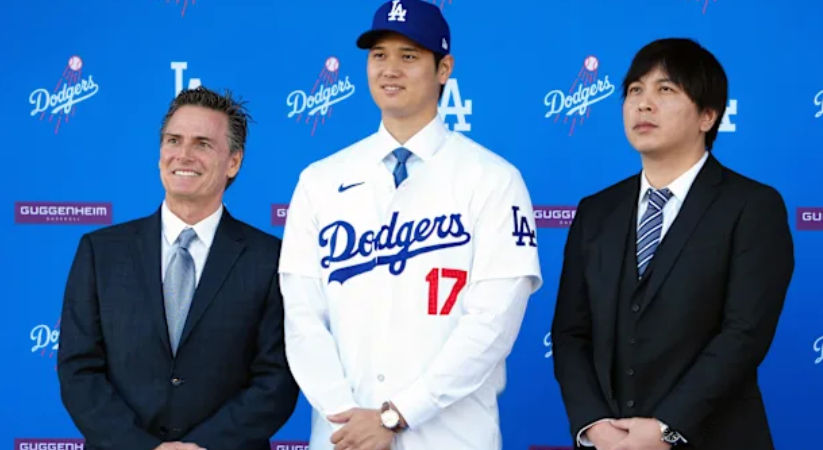In a stunning unraveling of trust and betrayal within the world of Major League Baseball, Ippei Mizuhara, the man who once facilitated communication for MLB sensation Shohei Ohtani, finds himself ensnared not in the web of words he once managed, but in a complicated web of financial deceit. With a sentence of 57 months in federal prison, the dramatic story of Mizuhara’s fall from grace is not just another tale of fame gone wrong but a sobering reflection on vulnerabilities within the cloistered circles of professional sports.
Mizuhara, a well-regarded interpreter who silently stood beside Ohtani during pivotal moments in his career, was unceremoniously thrust into the limelight for all the wrong reasons. His life, which was intricately tied to Ohtani’s professional ascent, spiraled in early 2024 when whispers of financial indiscretions began circulating through the grapevine. It was in March of this year that those whispers turned into a cacophony, following an explosive report by ESPN detailing Mizuhara’s alleged misconduct involving unauthorized wire transfers, credit fraud, and a staggering gambling addiction.
Much to the shock of the Dodgers organization and the Major League Baseball community at large, Mizuhara, who was once considered a linchpin in Ohtani’s personal and professional pursuits, had crafted an elaborate scheme that pilfered over $17 million from the three-time American League MVP. Imagine, if you will, a trusted confidant who gained illicit access to Ohtani’s financial accounts. Mizuhara reportedly engaged in audacious impersonations, mimicking Ohtani himself to execute financial maneuvers that would make even the savviest of con artists blush. The funds pilfered were allegedly funneled into gambling, various personal expenses, and even luxuries like sports memorabilia, occasionally featuring the very person he was defrauding.
But this tale of broken trust has another chapter. In a legal dance that could easily translate into the plot of a tense court drama, Ohtani managed to outsmart Mizuhara’s tactics when it came to recovering his assets. While millions vanished in a virtual puff, Ohtani, like the steadfast player he is, opted to formally demand what was never Mizuhara’s to begin with—a trove of high-end sports cards that Mizuhara had purchased using Ohtani’s own money. Judicial Karma sided with Ohtani, awarding him back these tangible pieces of memorabilia, which included treasures like Yogi Berra and Juan Soto cards, via a federal court decree in December 2024.
However, the long arm of the law did not stop at mere asset recovery. From the gavel, the court proclaimed Mizuhara guilty of an intricate tapestry of bank fraud, identity theft, and tax evasion—his actions more befitting of a Hollywood thriller antagonist than a baseball translator. The legal repercussions are as weighty as Mizuhara’s misdeeds. Alongside his prison sentence, Mizuhara will have to repay the colossal sum pilfered from Ohtani, all $17 million of it, in addition to coughing up another $1.1 million in unpaid taxes to an anxiously awaiting IRS. And with metaphorical shackles merging into very real ones, his future post-sentence awaits with possibilities of deportation looming over the horizon.
The seismic impact of Mizuhara’s deception does not merely weigh on the shoulders of those directly involved—it reverberates throughout the MLB and beyond. Shohei Ohtani, known for his humility and professional rigor, might not have spoken volumes about the betrayal, yet the silence reverberates with a sense of vulnerability that no one-man show on the baseball diamond should ever have to project off-field. This drama of deception is a clarion call to the entire sports industry: Athlete vigilance against financial mismanagement has never been more vital.
The exposé of Mizuhara, with its tentacles reaching into the predatorily charming world of gambling, serves as an indictment against unchecked trust and speaks volumes about the need for rigorous financial oversight in the lives of athletes who, while conquering fields and breaking records, often remain unnervingly susceptible to those lurking under the pretense of trustworthiness.
While the courtroom might have silenced one chapter of deceit, the lessons echoing amidst the locker rooms and clubhouses are louder than ever. In places known for the crack of a bat and cheers of adoring fans, there’s a quiet subplot now being dissected in whispers and after-game meetings: a reminder that stars like Shohei Ohtani aren’t just contending with opponents at the plate—but sometimes, with shadows much closer to home.
